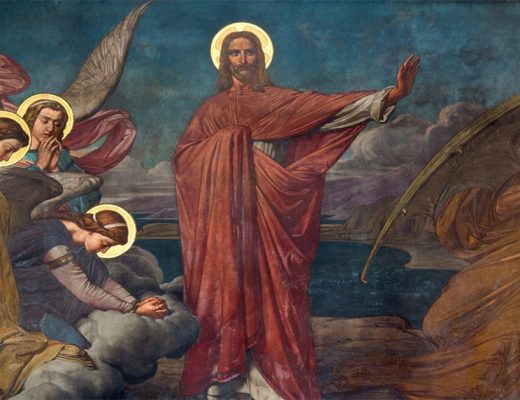In the practice of the Catholic Church teaching “THE CELEBRATION OF THE CHRISTIAN MYSTERY” document isstated that, sin has a two consequence:
- Eternal punishment that is a result of committing a grave/serious sin;
In which it deprives us of communion with God and therefore makes us incapable of eternal life. This loss is called the “eternal punishment” of sin, living in hell forever. Because mortal sin destroys charity in the heart of man by a grave violation of God’s law; it turns man away from God, who is his ultimate end and his beatitude, by preferring an inferior good to him (1855).
The teaching of the Church affirms the existence of hell and its eternity. Immediately after death the souls of those who die in a state of mortal sin descend into hell, where they suffer the punishments of hell, “eternal fire” (1035).
This punishment could be abolished/cancelled, or you can avoid it by means of confession to a priest only (not between you and God) NO. The remission of the eternal punishment gained by mortal sins could be granted only through the Sacrament of Confession. In other words the Church clarifies that, ‘Those who approach the Sacrament of Penance obtain pardon from God’s mercy for the offense committed against Him, and are, at the same time, reconciled with the Church which they have wounded by their sins (1422). As the book of Lamentations (5:21) proclaims ‘Restore us to thyself, o Lord, that we may be restored!’
And many questioned Jesus’ authority by saying, ‘who can forgive sins but God alone?’ But the Gospel of Mark dispels the doubt by saying, (2:5, 10), He is the Son of God as Jesus said of Himself, ‘The Son of Man has authority on earth to forgive sins,’ and exercises this divine power, ‘Then Jesus said to her, your sins are forgiven (Luke 7: 48).’
Moreover, by the virtue of the very same divine authority Jesus gave this power to men to exercise in His name, when He commanded His disciples in the Gospel of John (20:21-23), ‘… As the Father has sent me, I am sending you. And with that He breathed on them and said, receive the Holy Spirit. If you forgive anyone’s sins, their sins are forgiven; if you do not forgive them, they are not forgiven.’
St. Thomas Aquinas also explains that every mortal sin involves both turning away from God and His infinite goodness because the essence of mortal sin is to turn away from God. Consequently, the Sacrament of Penance removes the essence of mortal sin.
Also he affirms that the forgiveness of sins through the Sacrament of Penance has its effect through the power of Christ’s Passion because His passion sufficiently made satisfaction for all sins in which our Lord merited for us on the Cross.
Likewise the Council of Trent has taught that the debt of eternal punishment is forgivable only by the merits of Christ, for a person to be justified and be restored to the state of sanctifying grace.
Sin hurts our relationship with God, others and ourselves. As the Catechism states: ‘The sinner wounds God’s honour and love, his own human dignity…and the spiritual well being of the Church, of which each Christian ought to be a living stone. To the eyes of faith no evil is graver than sin and nothing has worse consequences for the sinners themselves, for the Church, and for the whole world, (CCC 1487, 1488).’
Although God is so rich in mercy and is longing to save people and make their souls beautiful as they were created in the beginning of creation nevertheless the fall of Adam and Eve made us inheritance of their disobedience; but only through the charity and obedience of Christ in His suffering could make satisfaction to God the Father for the sins of humanity. ‘For if, when we were enemies, we were reconciled to God by the death of His Son, much more, being reconciled, we shall be saved by his life’ (Romans 5:10), which no man could do out of his own power but only, the begotten Son of God. “For God so loved the world, that he gave his only begotten Son, that whoever believe in him should not perish, but have everlasting life” (John 3:16).
On the other hand every sin, even venial, (FORGIVEABLE) entails (INVOLVES) an unhealthy attachment to creatures, which must be purified either here on earth, or after death in the state called Purgatory. This purification frees one from what is called,
- The temporal punishment of sin.
Traditionally the Church also teaches that we must be purified in order to go to heaven: temporal punishment is for the remaining of our sins and what is resulting from eternal punishment after the sin is absolved, bad habits that we fail to conquer and attachments caused by sin and any lack of true sorrow for venial sins. It is clear that someone with any of these in his or her soul is not worthy of heaven.
“All who die in God’s grace and friendship, but still imperfectly purified, are indeed assured of their eternal salvation; but after death they undergo purification, so as to achieve the holiness necessary to enter the joy of heaven” (1030).
And St Thomas Aquinas said: the more we conform to the passion of Christ the greater is the pardon and graces in which we gain.
Also the church affirms, ‘these two punishments must not be conceived of as a kind of vengeance inflicted by God from without, but as following from the very nature of sin.
A conversion (CHANGE) which proceeds from a fervent charity, can attain the complete purification of the sinner in such a way that no punishment would remain.
The Church continues, ‘the forgiveness of sin and restoration (RENEWAL) of communion with God entail (INVOLVES) the remission of the eternal punishment of sin, but temporal punishment of sin remains. While patiently bearing sufferings and trials of all kinds and, when the day comes, serenely facing death, the Christian must strive to accept this temporal punishment of sin as a grace. He should strive by works of mercy and charity, as well as by prayer and the various practices of penance, to put off completely the “old man” and to put on the “new man.’ Eph4: 22, 24 (1473).
Also the Church grants indulgences to the faithful on many different occasions likewise the indulgences attached to many prayers that might benefit the soul and through them we can obtain the remission of temporal punishment resulting from sins, for ourselves and for the souls in Purgatory as well.
What are we learning from this?
All this is teaching us to have a certain hope that God loves us no matter how troubled we are, and we ought to hope in the assistance that comes from Him and to trust in Him. Because “Christian hope unfolds from the beginning of Jesus’ preaching in the proclamation of the beatitudes. The beatitudes raise our hope toward heaven as the new Promised Land; they trace the path that leads through the trials that await the disciples of Jesus. But through the merits of Jesus Christ and of his Passion, God keeps us in the “hope that does not disappoint.” Hope is the “sure and steadfast anchor of the soul . . . that enters . . . where Jesus has gone as a forerunner on our behalf.” Hope is also a weapon that protects us in the struggle of salvation: “Let us . . . put on the breastplate of faith and charity, and for a helmet the hope of salvation.” It affords us joy even under trial: “Rejoice in your hope, be patient in tribulation.” Hope is expressed and nourished in prayer, especially in the Our Father, the summary of everything that hope leads us to desire (1820).”
‘You were taught, with regard to your former way of life, to put off your old self, which is being corrupted by its deceitful desires; to be made new in the attitude of your minds; and to put on the new self, created to be like God in true righteousness and holiness.’(Council of Trent (1551): DS 1712-1713; (1563).






No Comments